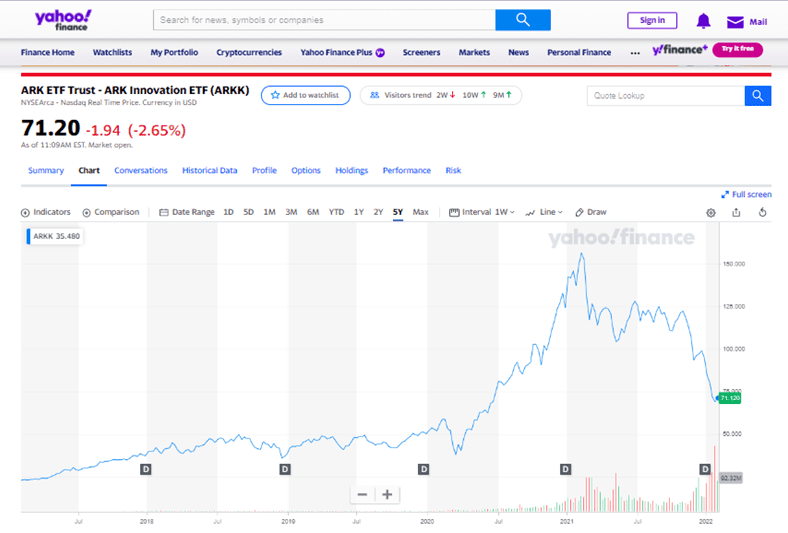As a former professional trader and enthusiastic investor, personally, I love volatile markets. While many investors jump in during the steady upward climbs, times like these fuel my love of finding the hidden treasure.
Having said that, don’t mistake this passion of mine as a call to jump into meme stocks and other momentum “opportunities” that promise quick gains.
Instead, now is when I look for value stocks that have the potential for significant growth over the long term. Sure, I may play around with a few select momentum stocks and alternative investments because I know what I can afford.
But, as I pointed out in the last post, now is our 10 minutes. These are the times to find the alpha, the edge, that will put you not only in the game, but in a better position. This takes time, research and commitment to weather ups-and-downs – and now is the time.
First, read the tape and do the research
I’ll give you an example of a masterclass in reading the tape. Although this investor isn’t someone who exemplifies the long-term strategy that I believe in (for that, you know I’ll always look to Warren Buffet and Charlie Munger), but who has expertly read the tape throughout the pandemic’s ups and downs.
Pershing Square Capital Management CEO Bill Ackman read the tape better than just about anyone. As the
Wall Street Journal recently reported, investments of about $200 million in the early days of the pandemic grew to about $4 billion. That’s a return of 20-to-1 in just a couple of years. Yowza.
There was no magic to this. It was simply studying trend lines and being prescient about where things were headed, then confidently investing in his research. He played it out exactly right, unencumbered by emotion. And my, oh my, how that paid off.
“As the coronavirus emerged, Bill Ackman made billions betting that the market was misjudging the virus’s economic toll.
Then he did it again a year later.
In two complex debt investments—one presaging the economy’s swift shutdown and the other its fevered reopening—Mr. Ackman made nearly $4 billion in profit on an outlay of about $200 million, according to fund documents and people familiar with the matter. In short, he called the pandemic’s economic fallout coming and going.”
Granted, most people aren’t able to peg this particular turn of events – the pandemic – as well as Ackman did and most of us don’t have his financial resources. And if you know Ackman’s story, you know that he’s an activist investor who’s also made some bad calls over the years. But still, this is a great example of leveraging opportunity.
Use it as insight into what I mean when I say read the tape to find your alpha.
Second, find the unsung hero stocks
As a sixth-round draft pick – the 199th player to be signed in 2000 – Tom Brady wasn’t lighting anyone’s football fire. After 22 seasons, he’s just retired as the league’s greatest quarterback, to be sure, and likely the best player ever.
When I first started out as a professional trader, one of my mentors gave me a piece of advice that I’ve always carried with me. He said, “Everything is baked in.”
Now, you may be wondering what the heck that’s supposed to mean, as I did, so I’ll tell you: What he meant was that if you think you know something, it’s likely that everyone else does, too.
You think you know the best quarterback from the class of 2000 because he’s the guy who gets drafted first? Righto. Now, no one remembers his name. Likewise, if you think that reading about an emerging company in a Wall Street Journal article puts you ahead of the pack because it’s “emerging,” you’re too late.
How prescient can you train yourself to be? Do your research, read the room, pay attention not only to what’s right in front of you, right now but how that’s likely to impact people’s behaviors – then figure out where those behaviors are likely to take them.
Then, find the unsung heroes buried in these volatile markets, the Tom Bradys in the pile. Find those companies that are flying under the radar, that haven’t hit the news. What to look for? Real value: Intellectual property, tangible products and services, a top management team, innovation, cash in the bank, net profitability that’s sustainable,
This will be your alpha, your edge – and that’s where you’ll find potentially golden opportunities. Balance out those risks with some solid performers and you’ll be well-positioned.
Third, be in it for the long game
I cannot stress this enough: The gamification of the markets has been and will continue to be the financial downfall of millions of people.
Meme stocks are one of several examples of investment plays that have quickly backfired for most investors when the markets are played like one enormous, quick-buck casino.
GameStop hit a high of $300 on June 8, 2021. Now, it’s wavering around $100. Also in mid-June,
AMC hit a high of nearly $63. Now, it’s struggling around $15. And does anyone remember Hertz?
“Be prepared. Traders crave price movement as it offers them the potential opportunity to make bigger profits. But at times, price movement can accelerate beyond what they’re used to.
With volatile markets, stocks can start to move so fast that closer attention and a change in tactics may be necessary. The key is to prepare in advance.
The steps discussed in this article are no guarantee to keep you on course, but they’re worthwhile if you’re ready to take on volatile markets.
When in doubt, wait it out. If you’re not sure where the markets are heading, just sitting on the sidelines isn’t a bad idea. Periods of heightened volatility come and go and—more often than not—are short-lived, so sometimes, the best trade to make may be no trade at all.”
If you’re caught up in an investment frenzy and FOMO hits, I have this advice: Either use every bit of willpower you have to walk away or, if it’s too much to resist, then do so with an amount that you can comfortably play, then use every bit of willpower you have to separate yourself emotionally. And if you’re lucky enough to have a gain, take your winnings and walk away.
Even seasoned investors and their portfolios are prone to volatility. Take Cathie Wood of Ark Invest. She’s a headliner whose funds – heavily weighted in tech and growth stocks – have fallen sharply from recent highs. Still,
as she sees it, now’s the time to buy the dip in those areas, so she’s just plunked down a whole lot of money in companies like Robinhood and Tesla.
Time will tell if she’s right, but overall sentiment has pivoted back to value stocks. As this
Business Insider headline tells it, “Value stocks just had their best month since the peak of the 2001 dot-com bubble — and there’s still more upside to come, Bank of America says.” The article continues:
“The Russell 1000 Value Index outperformed its growth counterpart by 6.2 percentage points in January, representing the best relative month for the index since March 2001, when the
Nasdaq 100 Index reached its dot-com era peak.
Over the past two months, value stocks outperformed growth stocks by 10 percentage points, signaling that the recent trend is accelerating. And according to Bank of America’s Savita Subramanian, the outperformance of value relative to growth can continue based on historical valuations.”
Of course, growth stocks have outpaced value stocks for some time, it’s true, and
they’re hardly dead in the water. But now’s a great time to look for value stocks for the long-term hold and to capitalize on current volatility.
In a nutshell: Don’t fear volatile markets – find your alpha, your edge, take emotion out of the equation, diversify and be smart.
Residential real estate
While the song remains essentially the same, there are some potential bright spots on the housing horizon if you’re still looking to buy a home as a longer-term investment.
As I’ve said ad nauseum, primary markets will stay tight, but rising interest rates will cause some competitive easing in secondary and tertiary markets. In addition, for potential buyers, perhaps one bright spot is the regret that many millennials (
and other first-time buyers) are expressing over their home-buying choices over recent years.
“…So finds a
new survey by real estate education platform Clever Real Estate that polled 1,000 people about their homebuying plans. Of the millennials who already own a home, 82% have at least one significant regret about their home purchase…
…It’s a consequence of shopping in
today’s housing market, which is filled with more aspiring homebuyers than homes…As the national median price of a house
climbed to record highs, competition heated up with all-cash bids and higher down payments. With the pressure on to snap up the rare house that was both available and affordable, some buyers didn’t realize they were making a hasty decision until it was too late.
Those who rushed to buy were more likely to experience financial remorse, the Clever Real Estate survey found. One in four millennials said their home value decreased while the same amount said that their mortgage was expensive.”
The article continues, pointing out that many also have location regret, buying in secondary and tertiary markets that don’t suit them.
We saw that writing on the wall in just about every post on this blog for nearly two years but even so, I’m not one to find comfort in anyone else’s misery. It’s likely that many will live with their decisions, finding ways to make things work, but it’s also likely that thousands will be looking to sell soon; that may help to ease competition in some markets.
Someone’s homeownership loss is always someone else’s gain and I always believe that it’s a good long-term investment, if you stay well within your budget and can manage the upkeep and expenses.
So, if you’re still in the market for a home, talk to your friends, colleagues, and neighbors who recently made a purchase.
Sometimes, that’s all the alpha/edge you need.








